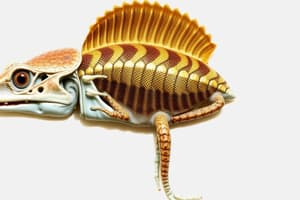Podcast
Questions and Answers
¿Qué característica define a los vertebrados dentro del reino animal?
¿Qué característica define a los vertebrados dentro del reino animal?
- Tener la capacidad de regenerar partes del cuerpo.
- Estar compuestos por células procariotas.
- Depender de la materia orgánica para sobrevivir.
- Poseer un sistema nervioso que les permite procesar información sensorial. (correct)
¿Por qué los vertebrados se clasifican de esta manera?
¿Por qué los vertebrados se clasifican de esta manera?
- Por ser multicelulares y depender de materia orgánica para sobrevivir.
- Por estar conformados por segmentos corporales independientes.
- Por tener una columna vertebral que les brinda flexibilidad y soporte para el movimiento. (correct)
- Por ser los únicos animales con capacidad de regeneración.
¿Qué nombre reciben los animales sin columna vertebral?
¿Qué nombre reciben los animales sin columna vertebral?
- Heterótrofos
- Procariotas
- Vertebrados
- Invertebrados (correct)
¿Qué función cumple la columna vertebral en los vertebrados?
¿Qué función cumple la columna vertebral en los vertebrados?
¿Qué otro reino biológico comparte cierta superposición con los animales, aunque no esté específicamente relacionado con la presencia de columna vertebral?
¿Qué otro reino biológico comparte cierta superposición con los animales, aunque no esté específicamente relacionado con la presencia de columna vertebral?
¿Qué característica común comparten los vertebrados más allá de tener una columna vertebral?
¿Qué característica común comparten los vertebrados más allá de tener una columna vertebral?
¿Cuál de las siguientes afirmaciones describe mejor a los peces?
¿Cuál de las siguientes afirmaciones describe mejor a los peces?
¿Cuál es una característica distintiva de los reptiles en comparación con otros vertebrados?
¿Cuál es una característica distintiva de los reptiles en comparación con otros vertebrados?
¿Qué distingue a las aves de los reptiles en términos de reproducción?
¿Qué distingue a las aves de los reptiles en términos de reproducción?
¿Qué característica comparten los mamíferos y las aves en términos de reproducción?
¿Qué característica comparten los mamíferos y las aves en términos de reproducción?
¿Cuál es una característica única de los mamíferos en comparación con los otros grupos de vertebrados?
¿Cuál es una característica única de los mamíferos en comparación con los otros grupos de vertebrados?
Flashcards are hidden until you start studying
Study Notes
Animals: A Diverse Group of Vertebrates
Animals are creatures that live on Earth, comprising a diverse group of organisms found across various ecosystems. While there is some overlap between animals and other biological kingdoms like bacteria, archaea, fungi, and plants, the term 'animal' primarily refers to multicellular heterotrophic living beings that consume organic matter to survive. One significant aspect of animals is their ability to move from place to place, allowing them to adapt and thrive in different environments.
One particular subset within the animal kingdom is the group known as vertebrates. These are classified as such because they possess a backbone or spinal column made up of bone segments called vertebrae. This characteristic structural feature provides protection to vital organs while also offering flexibility and support for movement. It's worth noting that not all animals with backs have backbones; those without a vertebral column are referred to as invertebrates.
Characteristics of Vertebrates
Vertebrate animals share several common characteristics beyond just having a spine:
- They possess a brain and nervous system that allows them to process sensory information and make decisions based on external stimuli.
- Their body plans typically involve segmented structures, meaning certain parts of their bodies can function independently and sometimes regenerate.
- Many vertebrates reproduce sexually through eggs or sperm, although some species engage in parthenogenesis - reproducing asexually by producing offspring entirely from unfertilized eggs.
- As complex life forms, vertebrates tend to require more resources than simpler organisms, leading to specialized diets and social behaviors.
These traits allow vertebrates to occupy a wide range of ecological niches around the world. They can be found everywhere from deserts to forests to oceans and even deep underground in caves. Moreover, many vertebrates play crucial roles in maintaining balance within ecosystems due to their interactions with various plant species and other types of wildlife.
Classification of Vertebrates
Within the realm of vertebrates, we find four main groups or classes:
-
Fish: This class includes aquatic lives like fishes and amphibians. Fishes are cold-blooded, lay eggs, and breathe underwater using gills. Amphibians start their lives in water and develop lungs later on for air breathing.
-
Reptiles: Reptiles are characterized by having scaly skin, laying eggs on land, being cold-blooded, and having moist skin during development. Some popular examples of reptiles include snakes, lizards, turtles, crocodilians, and birds.
-
Birds: Birds are warm-blooded, feathered vertebrates capable of flight. Like reptiles, they lay hard-shelled eggs. However, unlike most reptiles, they do not use moisture externally to regulate temperature. Instead, they rely on internal mechanisms involving the liver and kidneys to control heat loss.
-
Mammals: Mammals are warm-blooded vertebrates with hair or fur covering their skin, which helps insulate them against extreme temperatures and protects them from environmental damage. Most mammals give birth to live young rather than laying eggs. Examples of mammals include humans, elephants, bats, whales, dolphins, seals, and bovids.
In conclusion, animals serve as fascinating subjects for study due to their diversity and dynamic nature. Within this broad category, vertebrates form a significant portion, exhibiting unique physical attributes and behavioral patterns that enable them to thrive across various habitats worldwide.
Studying That Suits You
Use AI to generate personalized quizzes and flashcards to suit your learning preferences.




